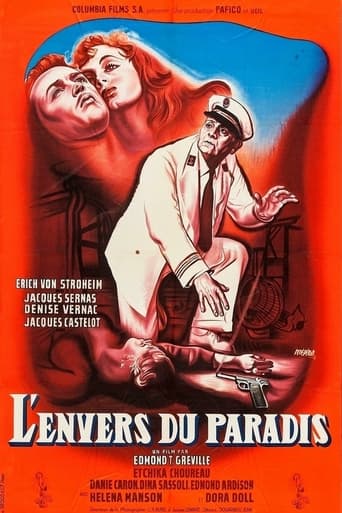writers_reign
Edmond T. Greville had almost 40 films on his Director's CV but is probably remembered only for The Hands Of Orlac which is a great pity as he proves himself here to be a fine craftsman. During the several years he spent making films in France Erich Von Stroheim played many diverse characters but never, to my knowledge, a pipe-smoking sea captain, still, there's a first time for everything. The only other 'name' in the cast is Dora Doll who by this time could phone in the stereotypical lush, slut, femme fatale, perm any two from three, and does so here as the drunken, sluttish wife of novelist manque Blaise d'Orliac, who takes a bullet where it will do the most good (note the similarity to Hands Of ... close enough for me to be able to say she perished at the hands of D'Orliac. Scott Fitzgerald's breakthrough novel in 1929 was This Side Of Paradise and clearly Greville wanted to show us another side and does so by straying into Marcel Pagnol country, literally in setting his film in Provence and figuratively by peopling his small town with Pagnol types as they might have appeared two decades after the Marius trilogy; on the other hand we could argue that what we have here is a prototype of Peyton Place which in 1953 was still in the head of Grace Metalious. Whichever way you slice it this is a fine French movie; a friend of mine has drawn attention to the bells which are heard throughout but he seems to have missed their secondary message; they were in fact warning us that the dreaded New Wavelet was on the horizon and that for a brief moment of madness fine films like this would be consigned to the trash can. Of more interest to me was the recurring motif of bars - the slats through which the cop looks down on Blaise, the back of the wicker rocking chair in the 'murder' scene etc, symbols which suggest that small towns in the open countryside are also prisons.
dbdumonteil
The story tales place in a small village in Provence where everybody should be happy.There are artists ,painting in the streets ,and people playing Pétanque (bowls) ....But the captain (Von Stroheim) warns us ...No hope here...Violaine is seriously ill and soon she will die .Her parents try to conceal the harsh truth but one day she finds her medical file.She decides to make the best of what is left for her.She's in love with a failed writer whose wife is an alcoholic shrew .When the young man kills his wife (an accident) ,Violaine who did not tell her love she was going to die ,decides to leave clues which will accuse her.What's the matter if she is arrested ? She's got so little time to live anyway..Music is splendid, never sad,never syrupy.But Edmond T Greville also uses the bells to stunning effects!Ring them bell indeed.When Violaine finds out she is soon going to die ,the bell is tolling outside;when the detective questions Blaise the writer ,or when he looks at the shoes of people passing by or when the lovers hide in the streets after Michèle's death ,here come those bells again,sometimes mournful,sometimes joyful,sometimes warning the heroes that their days are numbered.Biggest flaw is the two flashbacks which are not really necessary and weaken the plot.The detective story does not hang that much well with the moving melodrama.But "l'envers du Paradis" ,with its Sirkesque title,is a fine work of the French fifties.Like This?try these....La Foire aux Chimères Pierre Chenal 1946Pattes Blanches Jean Grémillon 1947
Trilby06
The other side of Paradise (L'envers du Paradis) where a very tender, emotional and funny Erich von Stroheim plays the make believe captain in a movie filled with deep beliefs of love. The atmosphere turns around the lives of simple people living in a little town whose lives are not as simple as it seems at first sight. Among hilarious sequences and dramatic performances the story fulfills the aim of the director, to show a place that looks beautiful but is instead the other side of paradise, where life goes on and where some people belief that true happiness is when you make happy another one. The camera cuts the scenes and this gives suspense to the story of this little place in France that could very well be "any place in the world."


